#saadat hassan manto
Explore tagged Tumblr posts
Text
"Is s zyada tkleef-de kuch ni ho sakta k apki umer apki ankho k samne guzarti jye or ap apni marzi s jee na saken." – Manto
"Nothing could be more painful than that your age pass before your eyes & you can't live by your will." – Manto
72 notes
·
View notes
Text
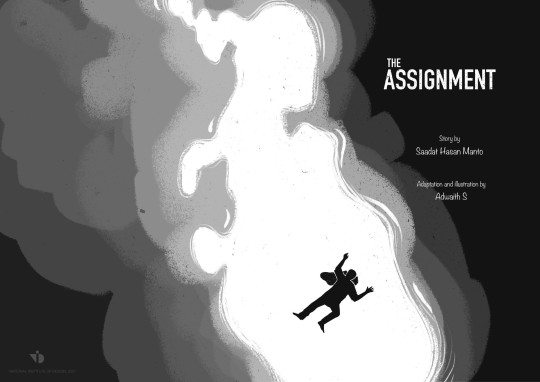
"The Assignment" is available to read here
Image credit to Adwaith S., who made a illustrated adaptation on art style. It's excellent, if you liked the story, read this too afterwards.
#short stories#short story#the assignment#saadat hassan manto#urdu literature#20th century literature#pakistani literature#indian literature#have you read this short fiction?#book polls#completed polls#links to text
10 notes
·
View notes
Text
"In the name of God, the Compassionate, the Merciful. Here lies Saadat Hasan Manto buried, and buried with him lie all the secrets of the art of storytelling in his breast. Weighed down by maunds of earth, he wonders still: Who is the greater storyteller, God or he?"
Saadat Hassan Manto's self-composed epitaph.
1 note
·
View note
Text
Saadat Hassan Manto: A Literary Genius and his Enduring Legacy
In the realm of South Asian literature, few names shine as brightly as Saadat Hassan Manto. Renowned for his unflinching portrayal of the human condition, Manto remains an iconic figure in the literary world. In this comprehensive article, we delve into the life, works, and enduring legacy of this extraordinary wordsmith. Join us as we explore the profound impact Manto has had on literature and how his timeless stories continue to captivate readers worldwide.
Early Life and Influences
Born on May 11, 1912, in Samrala, British India (now in Punjab, Pakistan), Saadat Hassan Manto exhibited remarkable literary talent from an early age. His formative years were spent in the vibrant city of Amritsar, where he was exposed to diverse cultures, languages, and perspectives. This rich tapestry of influences would later shape his distinctive writing style.
The Journey of a Literary Maverick
Manto's journey as a writer began with humble aspirations. He started his career as a translator at Urdu Service, All India Radio, and eventually transitioned to writing short stories. His works encompassed a wide range of themes, from the brutal realities of Partition to the complexities of human relationships. Manto fearlessly explored the darkest recesses of society, challenging norms and conventions along the way.
Manto's Literary Brilliance
Manto's storytelling prowess lies in his ability to capture the essence of human emotions and lay bare the raw realities of life. With his razor-sharp wit and incisive observations, he painted vivid portraits of characters grappling with their desires, fears, and societal pressures. His unique writing style, characterized by gritty realism and a profound understanding of human psychology, set him apart from his contemporaries.
Controversy and Courage
Throughout his career, Manto faced immense opposition and controversy due to the explicit nature of his stories. His unapologetic portrayal of sexuality and social taboos challenged the conservative norms prevailing at the time. Despite numerous legal battles and bans on his work, Manto stood his ground, defending the artistic freedom to explore the darker shades of humanity.
Legacy and Impact
Saadat Hassan Manto's books have left an indelible mark on the literary world. His courage to tackle taboo subjects and his unwavering commitment to truth and authenticity have inspired generations of writers. Manto's works continue to be celebrated for their powerful portrayal of the human condition and their ability to provoke introspection and reflection. You can Find Complete catalog of wasif ali wasif books at Nusraa bookstore.
The Relevance of Manto Today
In an era where social commentary and the exploration of human complexities are more crucial than ever, Manto's works have gained renewed significance. His stories, often set against the backdrop of tumultuous historical events, offer profound insights into the human experience. Manto's ability to reveal the unvarnished truth, even in the face of adversity, serves as a powerful reminder of the importance of preserving artistic freedom.
Inspiring Future Generations
Manto's enduring literary contributions have inspired countless aspiring writers and intellectuals. His fearless approach to storytelling encourages others to push the boundaries of creativity and challenge societal norms. Manto's unyielding commitment to truth and his relentless pursuit of artistic excellence serve as guiding beacons for those who strive to make a lasting impact through their words.
Conclusion
In the pantheon of literary greats, Saadat Hassan Manto stands tall as an emblem of courage, artistic brilliance, and uncompromising truth. His stories continue to enthrall readers with their raw authenticity and deep introspection. Manto's unparalleled ability to shed light on the complexities of the human condition cements his place as one of the most revered writers in South Asian literature.
0 notes
Text
saadat hassan manto was probably the only desi uncle who called men out on their bullshit
5 notes
·
View notes
Quote
The majority of society has not grown up intellectually to embrace the truth. That is why we are still living in the same society and stuck in time. That is why what Saadat Hassan Manto faced in his time is still the reality. The problems still exist and his story is still relevant. Like the way there were few liberal-minded people - writers, authors and intellectuals stood by him - in the present time, a few people have also stood by the film. Those few liberal-minded people are the reason why the world is still a nice place to live in. They are the hope that drives all of us to work with conviction and stand strong for the truth. Otherwise people will just look for an opportunity to kill each other.
Nawazuddin Siddiqui, on the movie 'Manto' being banned in Pakistan
#Pakistan#Nawazuddin Siddiqui#Manto#Saadat Hassan Manto#India#society#intellectual growth#truth#liberal-mindedness#conviction
32 notes
·
View notes
Text
دنیا میں آئینے نہیں تھے تو حسن تھا۔
اب آئینے ہیں پر حسن کہاں ہے؟
When there were no mirrors in the world, there was beauty. Today there are mirrors but where is beauty now?
— Saadat Hassan Manto
#fav#saadat hasan manto#urdu lines#urdu adab#urdu stuff#urdu#urdu poetry#deep#mirror#urduthoughts#urduqoutes#urdu sher#urdu poems#urdu language#urdu shairi#urduzone#promoteurdu#اردو پوسٹ#اردوشاعری#اردو زبان#اردو ادب#اردو#منٹو#manto
90 notes
·
View notes
Text
ہاتھ چھوڑنے والے کی اپنی 'اذیت' ہے اور ہاتھ چھڑوانے والے کی اپنی 'کہانی' ہے لیکن اس عمل میں 'محبت' یتیم ہو جاتی ہے.
One who releases the 'hand' has his own 'agony' and one who pull it away has his own 'story' but in this process 'Love' becomes an orphan.
— Saadat Hassan Manto
#urdu lines#saadat hasan manto#urdu literature#urdu stuff#urdu language#urdu adab#اردو#سعادت حسن منٹو
205 notes
·
View notes
Text
South Asian Academia
Things I want to learn this year
- Mughal History, Culture, and Architecture
- All about the transition from the Mughal era to the British era and the impact on common people in terms of tradition and culture
- Influence of the British on South Asian people
- Literature from pre-partition: themes, authors, literary works, and character analysis
- Literature from post-partition: themes, authors, literary works, and character analysis
- Difference in the themes of literature between the pre and post partition era
- How did Arabic and Persian influence Urdu
- History of Urdu
- The influence of Urdu on Politics
- Renowned Urdu literature, authors, and poets
- Basics of Persian (Urdu consists of many Persian and Arabic words; Urdu is a refined form of Persian)
- Difference in the current culture and art of India, Pakistan, and Bangladesh considering that they have the same foundation
- Post partition influence on Pakistani art and theatre
- Prepartition South Asian architecture: Mughal architecture, British rule, etc
- South Asian diaspora
- Influence of South Asian traditions on contemporary art and culture: figures, popular work etc
- Modern vs Traditional South Asian art and music
- History of Pakistan post independence
- South Asian history
- South Asian anthropology
- The evolvement of South Asian art ovet the the years and the relevant reasons
- History of Urdu literature
Other things I want to study this year
- Hitler
- Shakespeare
- Zulfiqar Ali Bhutto (a Pakistani political figure)
- Karl Marx
- About the renaissance and victorian era
- About the medieval British era
- Saadat Hassan Manto
- Other South Asian dark academic topics (please list them below)
#dark aesthetic#dark academia#desi dark academia#pakistan#dark acadamia aesthetic#dark academic aesthetic#karachi#desi aesthetic#india#desi academia#indian dark academia#chaotic academic aesthetic#chaotic academia#south asian#bangladesh
120 notes
·
View notes
Note
do you have any hindi literature recommendations which are not misogynistic or homophobic? thanks if you do :)
mahadevi varma, mannu bhandari, sharatchandra chattopadhyay, premchand, saadat hassan manto, devakinandan khatri, ismat chughtai, subhadra kumari chauhan and shivani.
these are the hindi authors. read up. plus, you can find many english books translated into hindi and you can read them up too :D
16 notes
·
View notes
Photo
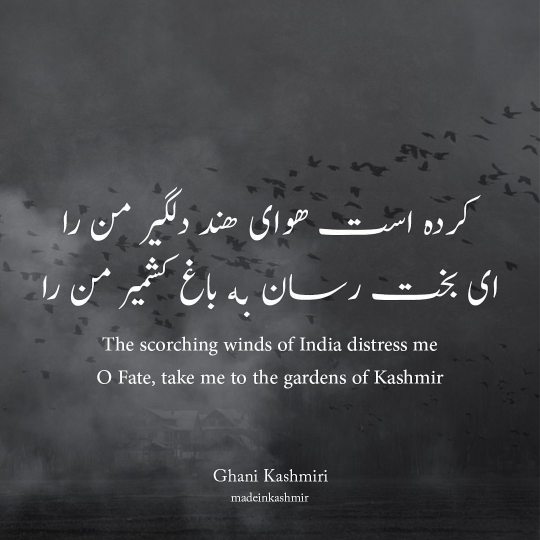
Mulla Mohammad Tahir Ghani Ashai was born in Razay Kadal, Srinagar in the 17th century during the Mughal Rule. Studying in the seminaries in Srinagar, Ghani commanded mastery over Persian under the tutelage of another Kashmiri poet Mulla Hassan Fani. Persian was the official language of Kashmir from 14th Century till 1899. Ghani’s poetry is regarded one of the finest works in classical Persian literature. HIs work influenced Indian poets such as Mir Taqi Mir, Mirza Ghalib and Mohammad Iqbal and also Saadat Hassan Manto. Ghalib translated more than 40 of his couplets into Urdu and Iqbal addressed him as the ‘nightingale of verse.’ Ghani Kashmiri’s fame reached India’s powerful emperor Aurangzeb. He was summoned many times to become the court poet but he defied those orders. One day, Ghani tore his clothes off and sent the messenger back with the words, ‘tell your emperor that Ghani has gone mad.’ He died three days after the incident. Ghani died in Razay Kadal where he was born. While many Kashmiris have forgotten him, even in his obscurity, he remains one of the greatest icons of Kashmir.
Sources: @irfanmairaj/Mudasir Farooqi/Nusrat Bazaz
Translation: Mudasir Farooqi/Nusrat Bazaz
Persian Transliteration: Aga Hani #kashmir #kashmirhistoryproject #kashmiripoetry #persianpoetry #mullatahir #ghanikashmiri #kashmiris https://www.instagram.com/p/CGSpFlSHQPG/?utm_medium=tumblr
5 notes
·
View notes
Photo
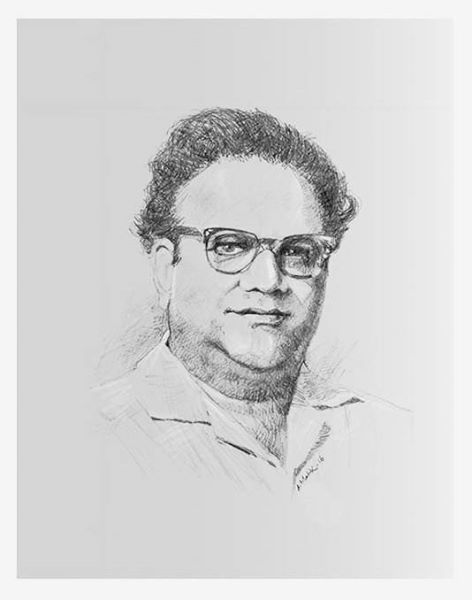
Tributes to Raja Mehdi Ali Khan, the famous Urdu poet, writer, and Hindi film lyricist, on his 54th death anniversary today.
Raja Mehdi Ali Khan was a famed writer and lyricist who rose to stardom within the Hindi film industry in the late 1940s till the 1960s. Khan was greatly influenced by contemporary Urdu poets and writers, the first of which was his mother, Hebay Saheba. He went on to establish himself as a protean lyricist who could pen ballads of romance alongside spirited verses of patriotic fervor with equal ease.
Born in Karmabad (present-day Pakistan), Khan began his early tutoring under his mother Hebay Saheba. Khan then worked under renowned poet Dr. Allama Iqbal. These early influences greatly inspired his poetry. By the 1940s, Khan began working at All India Radio in Delhi. Khan's association with veteran Urdu writer, Sadat Hassan Manto brought him to Mumbai where he started working as a dialogue writer in Hindi film industry. Khan got his first break as a lyricist with Filmistan's film Do Bhai (1946). The songs of the film were very successful and he went on to pen song lyrics for countless films within a short period of time. These included Shaheed (1948), Actress(1948), Vidya (1948), and Ziddi (1948).
Khan's association with music composer, Madan Mohan created some immortal songs in films such as Ada (1961), Mera Saaya (1966), Woh Kaun Thi (1964), Neela Akash (1965), Anpadh (1962) and Nawab Siraj-ud-Daulah (1967) amongst many others.
Raja Mehdi had also been associated with music composers like Khemchand Prakash, Bulo C Rani (Baghdad), S N Tripathi (Hatimtai, Paristaan), Shyam Sunder, Gulam Hyder, S D Burman, Ravi amd Roshan. He has given some wonderful songs with C. Ramchandra (Mere piya gaye Rangoon), O.P. Nayyar (Main Pyar Ka Raahi Hoon) and Laxmikant Pyarelal (for Anita and Jaal).
Raja Mehdi also worked with some lesser known composers like Basant Prakash (Nishan Danka), Iqbal Qureshi, Babul, S. Mohinder (Bekhabar, Paapi), Chic Chocolate (Rangoli), Rono Deb Mukerjhi (Tu Hi Meri Zindagi), Jimmy (Shrimatiji), N Dutta (Bhai Bahen), Nissar Bazmi (Khoj), Dhoomi Khan (Naqabposh), S Haridarshan (Shahi Bazaar), Robin Bannerjee (Masoom), etc.
Raja Mehdi Ali Khan was a close friend of great Urdu writer Saadat Hassan Manto. He wrote a character sketch of him namely “Main, Manto, Kaali Shalwar Aur Dhuwan”. He also wrote a poem in his memory “Jannat Se Manto Ka Ek Khat”.
After a successful career that lasted more than a decade, Khan subsequently withdrew from the Hindi film industry. However, he continued to publish his poetry and short stories such as 'Biswin Sadi', 'Shama Bano' and 'Khilona’ till his death in 1996.
He breathed his last on July 29, 1966, leaving behind a treasure of songs that are still cherished by all lovers of poetry in film songs.
Follow Bollywoodirect बॉलीवुड डायरेक्ट Bollywoodirect
#bollywoodirect #bollywood
4 notes
·
View notes
Text
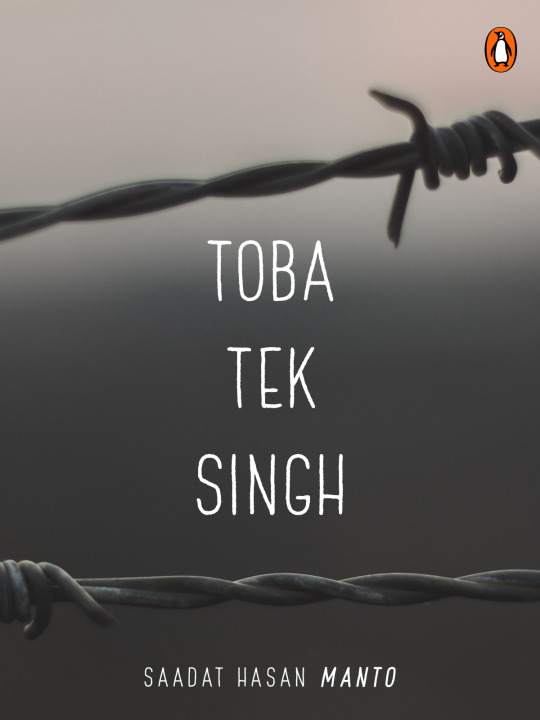
"Toba Tek Singh" is available to read here
#short stories#short story#toba tek singh#saadat hassan manto#urdu literature#20th century literature#indian literature#pakistani literature#me tagging both indian and pakistani literature kind of defeats the purpose of the story#whatever#have you read this short fiction?#book polls#completed polls#links to text
8 notes
·
View notes
Photo
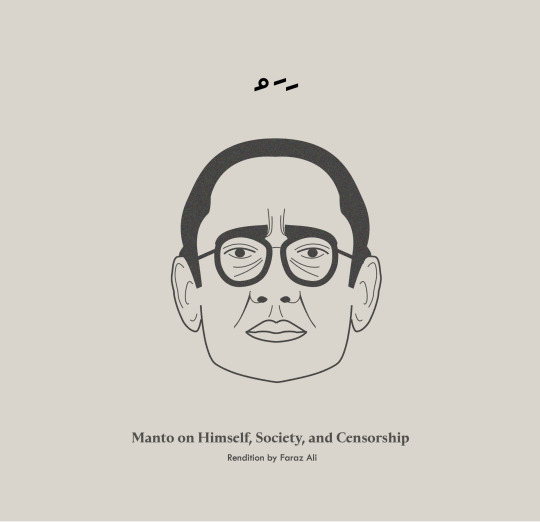
Saadat Hassan Manto
Illustration by Faraz Ali
2 notes
·
View notes
Photo

Famous URDU Fiction Writer Saadat Hassan Manto in his teens.
10 notes
·
View notes
Text
Moom Bati Kay Anso Afsana By Saadat Hassan Manto

موم بتی کے آنسو۔ افسانہ ۔سعادت حسن منٹو
غلیظ طاق پر جو شکستہ دیوار میں بنا تھا۔ موم بتی ساری رات روتی رہی تھی۔ موم پگھل گھل کر کمرے کے گیلے فرش پر اوس کے ٹھٹھرے ہوئے دھندلے قطروں کے مانند بکھر رہا تھا۔ ننھی لاجو موتیوں کا ہار لینے پر ضد کرنے اور رونے لگی۔ تو اس کی ماں نے موم بتی کے ان جمے ہوئے آنسوؤں کو ایک کچے دھاگے میں پرو کر اس کا ہار بنا دیا۔ ننھی لاجو اس ہار کو پہن کر خوش ہو گئی۔ اور تالیاں بجاتی ہوئی باہر چلی گئی۔ رات آئی۔ میل بھرے طاقچے میں نئی موم بتی روشن ہوئی اور اس کی کانی کانی آنکھ اس کمرے کی تاریکی دیکھ کر ایک لمحے کے لیے حیرت کے باعث چمک اٹھی۔ مگر تھوڑی دیر کے بعد جب وہ اس ماحول کی عادی ہو گئی۔ تو اس نے خاموشی سے ٹکٹکی باندھ کر اپنے گردوپیش کو دیکھنا شروع کردیا۔ ننھی لاجو ایک چھوٹی سی کھٹیا پر پڑی سو رہی تھی۔ اور خواب میں اپنی سہیلی بندوسے لڑ رہی تھی کہ وہ اپنی گڑیا کا بیاہ اس کے گڈے سے کبھی نہیں کرے گی۔ اس لیے کہ وہ بدصورت ہے۔ ‘‘ لاجو کی ماں کھڑکی کے ساتھ لگی، خاموش اور نیم روشن سڑک پر پھیلی ہوئی کیچڑ کو حسرت بھری نگاہوں سے دیکھ رہی تھی، سامنے بھٹیارے کی بند دکان کے باہر چبوترے پر انگیٹھی میں سے کوئلوں کی چنگاریاں ضدی بچوں کی طرح مچل مچل کر نیچے گر رہی تھیں۔ گھنٹہ گھر نے غنودگی میں بارہ بجائے، بارہ کی ��خری پکار دسمبر کی سرد رات میں تھوڑی دیر تک کانپتی رہی اور پھر خاموشی کا لحاف اوڑھ کر سو گئی۔ لاجو کی ماں کے کانوں میں نیند کا بڑا سہانا پیغام گنگنایا۔ مگر اس کی انتڑیاں اس کے دماغ تک کوئی اور بات پہنچا چکی تھیں۔ دفعتہً سرد ہوا کے جھونکے سے گھنگھرؤں کی مدھم جھنجھناہٹ اس کے کانوں تک پہنچی۔ اس نے یہ آواز اچھی طرح سننے کے لیے کانوں میں اپنی سماعت کی طاقت بھرنی شروع کردی۔ گھنگھرو رات کی خاموشی میں مرتے ہوتے آدمی کے حلق میں اٹکے ہوئے سانس کی طرح بجنا شروع ہو گئے، لاجو کی ماں اطمینان سے بیٹھ گئی۔ گھوڑے کی تھکی ہوئی ہنہناہٹ نے رات کی خاموشی میں ارتعاش پیدا کردیا۔ اور ایک تانگہ لالٹین کے کھمبے کی بغل میں آکھڑا ہوا۔ تانگہ والا نیچے اترا۔ گھوڑے کی پیٹھ پر تھپکی دے کر اس نے کھڑکی کی طرف دیکھا۔ جس کی چِق اٹھی ہوئی تھی۔ اور تخت پر ایک دھندلا سایہ بھی پھیلا تھا۔ اپنے کھردرے کمبل کو جسم کے گرد اچھی طرح لپیٹ کر تانگے والے نے اپنی جیب میں ہاتھ ڈالا۔ ساڑھے تین روپے کا کریانہ تھا۔ اس میں اس نے ایک روپیہ چار آنے اپنے پاس رکھ لیے۔ اور باقی پیسے تانگے کی اگلی نشست کا گدا اٹھا کر اس کے نیچے چھپا دیے یہ کام کرنے کے بعد وہ کوٹھے کی سیڑھیوں کی طرف بڑھا۔ لاجو کی ماں چندو سنیاری اٹھی اور دروازہ کھول دیا۔ مادھو تانگے والا اندر داخل ہوا اور دروازے کی زنجیر چڑھا کر اس نے چندو سنیاری کو اپنے ساتھ لپٹا لیا۔ ’’بھگوان جانتا ہے، مجھے تجھ سے کتنا پریم ہے۔ اگر جوانی میں ملاقات ہوتی تو یاروں کا تانگہ گھوڑا ضرور بکتا!‘‘ یہ کہہ کر اس نے ایک روپیہ اس کی ہتھیلی میں دبا دیا۔ چندو سنیاری نے پوچھا۔ ’’بس؟‘‘ ’’یہ لے۔ اور‘‘ مادھو نے چاندی کی چونی اس کی دوسری ہتھیلی پر جما دی۔ ’’تیری جان کی قسم! بس یہی کچھ تھا میرے پاس!‘‘ رات کی سردی میں گھوڑا بازار میں کھڑا ہنہناتا رہا۔ لالٹین کا کھمبا ویسے ہی اونگھتا رہا۔ سامنے ٹوٹے ہوئے پلنگ پر مادھو بیہوش لیٹا تھا۔ اس کی بغل میں چندو سنیاری آنکھیں کھولے پڑی تھی اور پگھلتے ہوئے موم کے ان قطروں کو دیکھ رہی تھی جو گیلے فرش پرگر کر چھوٹے چھوٹے دانوں کی صورت میں جم رہے تھے۔ وہ ایکا ایکی دیوانہ وار اٹھی اور لاجو کی کھٹیا کے پاس بیٹھ گئی۔ ننھی لاجو کے سینے پر موم کے دانے دھڑک رہے تھے۔ چندو سنیاری کی دھندلی آنکھوں کو ایسا معلوم ہوا کہ موم بتی کے ان جمے ہوئے قطروں میں اس کی ننھی لاجو کی جوانی کے آنسو چھپ کر بیٹھ گئے ہیں۔ اس کا کانپتا ہوا ہاتھ بڑھا اور لاجو کے گلے سے وہ ہار جدا ہو گیا۔ پگھلے ہوئے موم پر سے موم بتی کا جلتا ہوا دھاگا پھسل کر نیچے فرش پرگرا اور اس کی آغوش میں سو گیا۔ کمرے میں خاموشی کے علاوہ اندھیرا بھی چھا گیا۔ Read the full article
2 notes
·
View notes